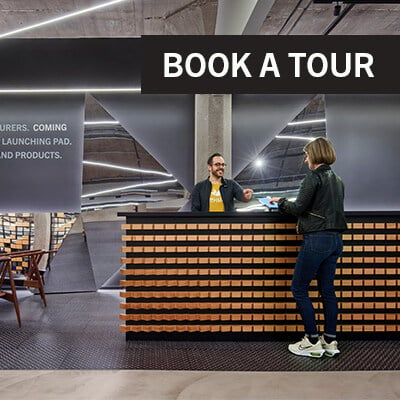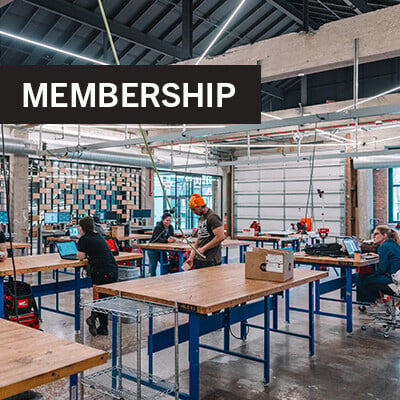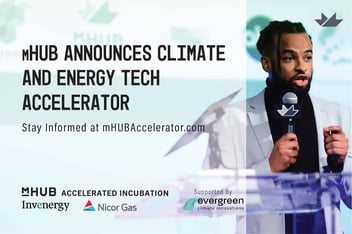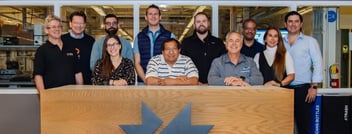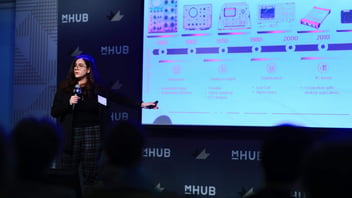On March 14th, Thierry Van Landegem, Executive Director of the upcoming mHUB Accelerator cohort focused on climate and energy technologies, spoke with partners and sponsors of the cohort from Nicor Gas, Invenergy, and Evergreen Climate Innovations. The 4 leaders discussed the problem areas that startups should be focusing on in the industry, as well as what startups will get out of partnerships with these large corporations.
Thierry: Welcome to this panel discussion. My name is Thierry Van Landegem. I’m the Executive Director of the accelerator at mHUB with an upcoming cohort on climate and energy technologies. I am here today with three esteemed people in the field and mHUB Accelerated Incubation Corporate Partners: Meena Beyers, VP of Business and Community Development for Nicor Gas; Erik G. Birkerts, CEO of Evergreen Climate Innovations; and Jordan Leventhal, Growth and Innovation, Office of the CEO at Invenergy.
Meena: Hello and thank you. In my role as the VP of Business and Community Development for Nicor Gas, I lead growth, strategy, community affairs, energy efficiency, and much of our innovation and social impact. I’m excited to be here in this discussion with all of you today.
Jordan: I lead the growth and innovation team at Invenergy, which is the largest privately-owned renewables developer in the U.S. In my role, I lead the strategic initiatives across the company focused on our core technologies of wind, solar, battery storage, transmission, and natural gas, as well as new technologies, such as hydrogen, long-duration storage, and others.
Erik: I am the CEO of Evergreen Climate Innovations. We recently rebranded, so for the first 10 years of our existence, we were known as Clean Energy Trust, so maybe that rings a bell with some people. Our mission is to provide catalytic seed investment and support to high potential companies that are working on clean energy, decarbonization, and environmental sustainability solutions.
I am really excited about this program. We really wanted to engage as we are seeing so many driven, super-smart people dedicating their careers to the climate imperative, and we want to do whatever we can do to help them be successful.
Thierry: Thank you all three for introducing yourselves. I always believe that when you listen to panel discussions, it’s great to know a bit more than just the formal title and the role in a company. Tell us why you’re doing what you do, it can be a fun fact or something that is driving you in your activity.
Meena: Great! Well, what I find really fascinating about this work and being in this space is how clean energy innovation is really the nexus between community and business. Where those two meet is something that I’m passionate about. From infrastructure to housing to economic growth, it’s amazing to see how innovation and these startups in clean energy are weaving that together to make an impact. That’s what I love about it.
Jordan: I’m really inspired by the technology that is being brought to bear to solve the climate crisis. One fun fact from our end is that Invenergy just a couple of weeks ago was successful in winning a lease off the coast of New York for an offshore wind project that will enter construction later in this decade. The turbines that we’ll install in that project are likely to be roughly the size of the Eiffel Tower. If you imagine the turbines that we were installing 10 years ago were 1-2 megawatts, these turbines will potentially be 18-20 plus megawatt turbines. It’s just unbelievable to see the pace of innovation in technology in this space and that really inspires me to come to work every morning.
Erik: First off, I’m really inspired by the super-smart, driven people who are dedicating their lives to the climate. We are big believers in just the powerful levers that entrepreneurship and innovation can play in affecting massive change and when it’s focused on the climate fight, it’s just an enormously powerful way of affecting change and driving solutions into the market that could really have an impact.
Thierry: I was just thinking about what we hear over the last not only days, but weeks, and years with an increasing focus on climate change. Erik, can you provide us with a bit more context on what the main drivers we hear just as plain old consumers and users, employees of companies, and entrepreneurs. What are these drivers that make this so prevalent?
Erik: Unfortunately, the climate has truly reached people’s consciousness just in this past year between wildfires, what’s happening in California, the extreme weather events in the Gulf region, and even in the mid-country. These are all extreme events in which people are suddenly quite conscious. Yale University recently did a study to measure at what level do Americans worry about climate change, and 75% of the respondents said it is something that they’re very concerned about. It is reaching the front of people’s awareness and consciousness, and as a result, you’re seeing big companies respond.
You’re seeing companies making net-zero commitments in their operations. I think one-half of large publicly traded companies now have publicly stated net-zero climate goals, and Wall Street is also paying attention. Larry Fink, who is the head of BlackRock, said that climate risk is investment risk. When you have a leading money manager in the world making a statement like that, people really stand up and take notice.
Thierry: I totally agree. It seems that all the stakeholders, whether it’s the company, the corporations, the consumers, as well as the investors and regulators, are coming together to work on this. Meena, based on what we just heard, have you seen a noticeable change within Nicor Gas with a higher focus than in the past? Can you give some context on that?
Meena: Absolutely. At Nicor Gas, we’re a part of the Southern Company family of companies that have set a net-zero target by 2050. We at Nicor Gas are the largest natural gas distribution company in Illinois, and we know that we have played a major role in many emissions reductions to date over the past decade. We know that we’re a foundational part of this transition to a clean energy economy and how we’re able to move it forward. Just like Erik described, we’ve been evolving our own business to really step up and emerge as a leader in this evolving energy economy.
We have set a target at Nicor Gas to achieve net-zero methane emissions by 2030 and that’s from our own operations. We’re driving innovation and investments through partnerships with mHUB and Evergreen, for example, but really looking at startups that are helping customers with end-use emission reductions as well as startups that are helping us with our own operations and systems that can help us with those emissions targets.
We’re empowering customers with energy efficiency. We have one of the largest natural gas conservation programs in the country, and we’re also starting to make great strides in renewable natural gas and making sure that we’re offering negative carbon solutions for those customers as well. We’re partnering with communities in ways that we never have before.
We understand at Nicor Gas, serving more than 650 communities in our footprint, that a rising tide lifts all boats. So we’re trying to do a lot in communities and really trying to see how we can engage those that may be left behind or have been left behind in other evolutions so that we can bring them along as a part of this clean energy revolution.
Thierry: That’s great and I’m happy to hear that. Again, this is the whole ecosystem that you’re bringing into play here which is important. Jordan, we know that your company is focused on renewable energies so you’re probably on that forefront for a long time. But with the latest developments that we are seeing, has that changed?
Jordan: That’s right, Invenergy has been involved in renewable energy development and deployment since the early 2000s, so this is not a new space for us. I think that some of the points that Erik made that the tune has really changed in the last two to three years where traditionally we relied heavily on incentives for renewables build-out, and there was constantly a comparison of the cost of renewable energy to other sources of degeneration.
That messaging has started to go away. I think folks understand at this point that renewables have reached cost parity with many other sources of generation. It’s less about the cost and more about how can we go faster? How can we accelerate the transition to sustainable energy?
We’re seeing more demand than ever for our core platforms, wind and solar, but we’re also having lots of discussions about other technologies that will really enable the transition to 100% clean energy. Those are technologies like battery storage, more investment in long-distance high voltage DC transmission capacity, and other emerging technologies such as hydrogen – which I’m sure we’ll talk about today. The pace is really accelerating and the urgency and understanding that we need to act quickly is really picking up.
Erik: If I may add to Jordan’s point, the fact that costs have come down as dramatically as they have for wind, and solar, and storage – it’s creating proof points that investors and others can look to when they’re looking at new technologies. Whether that’s direct air capture or long-duration storage or hydrogen, they can start seeing that it is possible to drive those costs down to a point where you’re at parity or better when compared to traditional fossil sources.
Thierry: Erik to your point, what I’m hearing from Meena and Jordan is there is this awareness – there is a change happening, but we all know that even the biggest companies cannot do everything on their own because this is way too complex and way too big than what we have seen or heard previously. So, there is great opportunity in several new technologies to solve these stringent problems. Erik, in the frame of Evergreen Climate Innovations, you’re in the middle point working with startups and other stakeholders. What are the major areas where you see significant activity? Where is the action when it comes to startups?
Erik: The activity is across every possible sector of the economy. From traditional electrons through to looking at the food chain and alternative proteins and things like that. I think pertinent to this conversation is the fact that we are seeing new innovations involving deep technology or hard technology, particularly those that are focused on sectors of the economy that historically have been difficult to decarbonize. That clearly includes cement, steel, and heavy-duty transportation, which is a sector where we’re seeing a lot of activity.
There you can see hydrogen at play. You can see batteries and energy storage at play. You can see charging infrastructure, software and analytics around route optimization and other ways of becoming more efficient.
We’re seeing significant activity around hydrogen; parsing those further technologies for better electrolyzers, technologies for membranes that go into fuel cells, so a lot of activity in the emerging hydrogen economy. And carbon removal is an interesting sector as well.
There are interesting technologies involving direct air capture, and in that space, you’re seeing advancements in regenerative agriculture and effective carbon removal strategies. It’s amazing that this innovation is happening in so many different sectors. What’s new is just that people are diving in and tackling some of these hard technology and science-based challenges.
Thierry: Erik, I’m glad that you use the term hardtech because that’s the core of what and who mHUB is. We are a hardtech innovation ecosystem. We have more than 450 hardtech startups that are working with us or have worked with us. The focus that we have is that we want to help hardtech startups in the field because we all know that it is hugely capital intensive, that it takes time, so we help them.
That’s one of the reasons why mHUB’s upcoming climate and energy tech sector accelerator cohort is so important. We have applications for startups open for the first cohort until the end of March 2022, where the intent is really to help these startups move forward on their path to commercialization.
I want to give the floor to both Meena and Jordan because when we look at hardtech startups in the broader climate and energy space, it’s so broad that we had to make some choices and say, “You know what, we cannot cover everything, but there are a number of areas where we really want some further help and support because we believe this is so critical in our journey towards that net-zero goal.”
Let’s dig into a few examples of areas where you believe Nicor Gas really wants to see some input from startups.
Meena: Absolutely, and you’re right. It was amazing when we started to think about hardtech and the opportunities to find startups that can help us address these problems and help us take on these challenges, we really did have to whittle it down. There were so many opportunities.
Some of the areas I’m really excited about is carbon capture, utilization, storage, and hydrogen production. We know that industrials are going to be one of the hardest areas to decarbonize, and they represent a quarter of emissions across the US. Here in Illinois, cracking the nut there really represents significant opportunities for us because we are also one of the most diversified economies in the country.
We’re starting to see a manufacturing rebirth and a boom of industrial growth in the company which can be transformative for our communities with job creation and community impact.
Trying to find the technologies that are going to enable those emissions reductions while attracting those businesses and being a part of this local economy here is such a critical part of how we not only reduce emissions but also attract new businesses as a part of this clean energy economy. We’re doing some work in hydrogen exploration right now.
At Nicor Gas, we believe that we likely play a role in that economy, and we think that’s going to be a great way not only to support decarbonization of the transportation sector but like Erik mentioned, really looking at those industrial end-use technologies.
So, some of the things that we’re really looking at are related to that carbon capture opportunity for production, looking at other ways that we can utilize hydrogen. Maybe it’s end-use appliances or technologies that can help accept hydrogen instead of fossil fuels, but that’s certainly an area that we’re excited to see a lot of startups in hardtech doing some great work today.
Thierry: It’s a huge domain, and there are indeed many challenges when it comes to production, but also the usage of it and the transport of these new energy sources. Of course, with all the intent being to get to that net-zero concept.
I also read that we should be talking more about net positive, meaning that we should do more than just getting to the zero level. Decarbonization efforts, all the actions related to carbon capture utilization, sequestration storage that was mentioned, these are all areas requiring activity moving forward.
Jordan, what are some examples from your side? What are the key areas when it comes to startups, that you really want some further input?
Jordan: Going back to the discussion earlier about where we are in the clean energy transition, in this decade we’re really focused on two areas. The first is scaling up the deployment of renewables and making sure that we can deploy gigawatts of wind and solar over the next decade to really be the bedrock of the clean energy transition.
We also need to think into the 2030s and 2040s – there’s going to be a host of new technologies that are needed to manage the grid when it has a significant number of renewables and to decarbonize some of these other sectors, like the industrial sector, for instance.
In that first bucket of scaling up renewables, Invenergy is very interested in technologies that will continue to optimize the operations of our renewable assets and our ability to deploy renewables into more challenging geographies.
One example of that is Invenergy is starting to use drone technology across our fleet whether it’s for inspection of blades or inspection of solar farms to identify faults or other issues. There are all kinds of opportunities for innovation in the operation and development construction of wind solar transmission and other renewable technologies. Really interested to see startups that are working on those types of technologies.
In the emerging technology space, hydrogen is an area that we’re really excited about. We think that there’s a significant opportunity to make green hydrogen from electrolysis technologies and we’ve seen the cost come down over 90 percent over the last decade on both wind and solar, so we’d love to see the same thing happen with electrolysis. We think it’s susceptible to significant costs down and innovation so that’s an area that we’re interested in seeing startups focused on.
Thierry: Jordan, I’m happy that you mentioned both emerging technologies because everybody is thinking of these emerging technologies. Carbon removal and
Utilization, hydrogen, and so forth. You also mentioned, “optimizing what we have.” I think all you know all stakeholders too often forget that making even better what we currently have is a huge field of opportunity. Too often we take a stance where we say, “well it works, don’t touch it.”
There is also a need for newer and better technologies that can result in efficient and more optimized use of current energy sources. These are a couple of areas that both Meena and Jordan highlighted. I remember what Erik was mentioning at the beginning asking why there is so much awareness? It’s because we all feel it. You mentioned the wildfires in California, for example, or on the West Coast in general.
What we don’t think about is these extreme climate conditions also impact what we do with current energy sources. Jordan has once mentioned in a brainstorm to think about a moment with the wildfires. What is the impact if a wildfire gets to my solar panel field or the impact of the ice and snow conditions on my wind farm? You see all these aspects of making better what we do currently.
There are different problems where both Invenergy and Nicor Gas want more support and help. That’s what we want to do. We want to not only help our own organizations but also the industry as a whole and society because it becomes a challenge and a problem for all. Now, this is really a question for all three of you. A question that I often get when I talk to startups is how can these corporations help me as a startup? Can you all say a few words about that?
Jordan: I think the first and the most obvious which is part of the mHUB Accelerator Program is that we plan to make seed investments into a handful of the startups that come through the program. Beyond that, I think that there’s a lot of expertise that Invenergy can bring to bear to really help these companies scale their technologies and ensure that they have a viable product and business model.
With that in mind, our intent is to assign mentors to each company where we have subject matter expertise that’s relevant to that company. We have experts across wind, solar, storage transmission, hydrogen, you name it. We plan to engage those folks and pull them into the program so that there’s a direct link to those companies.
Lastly, I think the goal of the accelerator is really to do just that, to accelerate the scale-up and deployment of these technologies and so ideally, at the end of this program we’ll have several companies that are ready to put their products into the field and really demonstrate the viability on a commercial scale.
We’d love the opportunity to partner with companies to do pilots or demonstrations of their technology at our facilities whether that’s in the Midwest or elsewhere in North America or globally. We’re looking forward to seeing the applications and partnering with some great companies.
Thierry: Meena, we just heard from Jordan and his company’s ways to help and support these startups in the accelerator. Can you say a few words about what Nicor is planning to do?
Meena: Very similarly, we’re going to be bringing our talent and our network to this accelerator. There’s a lot of excitement across Nicor Gas and Southern Company, our parent company, to be able to get engaged and support these startups. Our new ventures team in Southern Company which works with startups across the country as well as a 50-year-old R&D team that runs the national carbon capture research center. These are all resources that will sort of bring to the table to support.
We’re trying to find opportunities to commercialize and deploy and test out and demonstrate some of the technologies as well. We have a vast network, not only in the Chicago region, but across seven states where we’ll be able to leverage that work with other utilities as well. We’re excited to look for those opportunities to really partner with the startups that are in the cohort.
Thierry: Erik, I was hearing Meena and Jordan mention their networks. I know that startups can count on Evergreen in the networking part as well, right?
Erik: Absolutely. At Evergreen, we’ve been working on helping entrepreneurs commercialize clean tech for over 12 years. We can certainly bring domain expertise to the table on that front, from things that include helping think through beachhead markets, helping think through product-market fit, helping think through unit cost pricing. To your point Thierry, I think the real benefit that to the table is the network that we’ve cultivated across 12 plus years of working in the commercialization space.
So, we certainly want to leverage that network which includes connections to other corporations in addition to Nicor and Invenergy, it includes connections to other valuable programs and resources that exist or non-diluted funding sources that exist, connections to follow-on investors. Those investors who may be very interested in coming in making an investment after the seed investments are made.
Evergreen is contemplating making investments as well. All of that is the package that we bring to complement a lot of the sheer domain knowledge mHUB has on hardtech and physical product focused innovation.
Thierry: I would like to add on top of what you are all saying that mHUB as part of its accelerator program is also investing through its mHUB Product Impact Fund directly in each of the startups in the accelerator. There is not only our fund that invests, we heard our guests here that they also will invest further in a selected few of these startups.
We know from talking to startups in general that fundraising is difficult and hardtech startup fundraising is even more difficult so having that money on the table is extremely important. That is next to the networking aspects that our three guests have been mentioning but also all the subject matter expertise that is on the table there.
I’m a strong believer in that collaboration between both startups and major corporations. I think that summarizes what we are trying to do with the mHUB Accelerator thanks to our partners and sponsors Nicor Gas, Invenergy, and Evergreen Climate Innovations.
I really want to thank all three of our guests Meena, Jordan, and Erik for your contribution to this session. I think we covered quite a few points, so for those startups that are interested in participating in the mHUB Accelerator please get in touch with us you can also go to our website mhubaccelerator.com where you can find more information. All four of us are happy to help you to make the right choice.
Applications close on March 28th at 11:59PM. Apply here.
